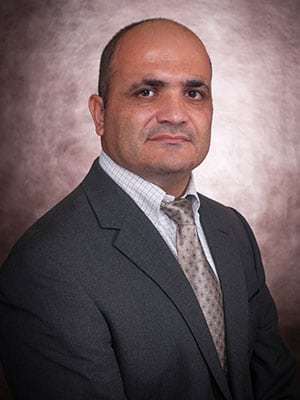Electrical Engineering (MSc, 1.5 Years or 3 Semesters)
| Duration | 1.5 years |
| Qualification Awarded | Electrical Engineering (MSc,1.5 years or 3 semesters) |
| Level of Qualification | Master Degree (2nd Cycle) |
| Language of Instruction | English |
| Mode of Study | Full-time and Part-time |
| Minimum ECTS Credits | 90 |
No enrolments for current semester
Request Information
The Master’s degree advances student’s knowledge in core areas of Electrical Engineering beyond the undergraduate level and introduces them to current and emerging trends and technologies. The program provides the students with the opportunity to carry out research within the field, while strengthening the candidate’s effective application of methods and techniques to tackle challenging technological problems. The curriculum prepares the student for a wide variety of Electrical Engineering careers, such as design, research, development, management, and teaching. The degree constitutes an independent and terminal study in addition to providing the basis for acceptance to, and continued studies towards, a doctoral degree in Electrical Engineering or a related field. The content of the program is focused on four very hot thematic areas, namely, (a) Signal Processing & Communications, (b) Electromagnetics, Antennas & Microwave Engineering, and (c) Renewable Energy Sources and Power Systems, and (d) VLSI & Embedded Systems and allows the students to choose those courses that will meet their future career goals.
The general objectives of the program are to:
- Prepare students to succeed in a constantly growing, highly demanding and competitive technological world;
- Create an academic environment conducive to learning new technologies and engineering concepts;
- Introduce students to research on advanced engineering topics;
- Cultivate analytical skills and critical thinking;
- Provide specialization and extensive knowledge on the areas of concentration;
- Promote engineering ethics and moral practices.
The specific objectives of the program are to:
- Provide specialized advanced knowledge and tools to our graduates in order to cope successfully in a technologically challenging environment;
- Facilitate learning in areas of electrical engineering that are directly linked to industry and current state-of-the-art technology;
- Provide the theoretical and computational skills necessary for the solution of both theoretical and practical engineering problems;
- Provide practical and experimental hands-on experience that allows the students to link directly to fundamental knowledge and theory;
- Prepare graduates to work alone or in groups in order to provide engineering solutions;
- Prepare graduates to design/implement systems and processes towards the solution of engineering problems;
- Promote research, develop research skills and provide fundamental knowledge to support a successful career in research and development;
- Develop the ability of the graduates to write technical reports and scientific papers as well as to present their work before an audience;
- Provide the graduates with the opportunity to develop a greater technical competence in their area and become successful professionals throughout their lifetime;
- Prepare graduates for admission to a PhD program in electrical engineering.
Occupational Profiles of Graduates with Examples
Graduates of the Masters’ program can be employed in a number of sectors including:
- Private companies;
- Public organizations;
- Semi-government organizations;
- Universities and colleges;
- Research institutions;
- Technical high schools and professional training schools;
- Telecommunications companies;
- Army, navy, and defense companies;
- Radar and monitoring system facilities.
Access to Further Studies
Graduates of the programme can be accepted into Third Cycle degrees (Doctoral Degree)
The program admits students in the Fall and Spring semesters. Applications for admission to the program will be considered only from candidates who fulfill the minimum entrance criteria as specified below:
General:
Eligible applicants must hold a Bachelor degree in Electrical/Electronic Engineering or related field granted by an institution recognized in the country where it operates. Applicants who do not hold their Bachelor’s degree at the time of application, but will hold such a degree before the commencement of the graduate studies, are also eligible to apply. However, such applicants must submit a letter from their University’s Registrar verifying that they are indeed eligible to graduate before the commencement of the graduate program. The decision on their admission does not become official until they have successfully obtained their Bachelor’s degree. It is desired that applicants have a cumulative point average (CPA) of 2.5/4.0 in their undergraduate work (or equivalent according to the academic system followed in the country of study). Under special circumstances, students with marginally lower CPA may still be admitted. English Proficiency is also required as described below.
Students who are admitted into the MSc program in Electrical Engineering and do not hold an undergraduate degree in Electrical/Electronic Engineering must possess fundamental knowledge of basic concepts in the following courses/areas: Circuits and Electronics, Signals and Systems, Electromagnetics and Microwaves, Telecommunications and Networks, Digital Systems Design and Testing. The student’s Academic Advisor is responsible to guide the student in acquiring the missing knowledge. This can be achieved by assigning a maximum of four (4) additional courses from the above areas (possibly from the corresponding undergraduate program of the Department).
Specific:
Each application for admission should include:
- A cover letter clearly stating the graduate degree the candidate wishes to apply for;
- A completed application form;
- A Curriculum Vitae indicating the student’s education, academic and professional experience, any publications, awards, etc.;
- A short statement stating the reason the candidate wishes to join the program, the candidate’s professional experience, future goals, etc.;
- At least two recommendation letters from academic or professional advisors;
- Copies of representative publications, if any;
- Copies of all degrees and transcripts. If applicable, a letter from the Registrar of the student’s current university verifying the expected graduation date should be included;
- Copies of any other supporting material, such as results of exams, honors, awards, etc.;
- Evidence of proficiency in English language in case the official language of instruction during the undergraduate studies was not English (at least a TOEFL score of 550 paper-based or 213 computer-based, or GCSE “O” Level with “C” or IELTS with a score of 6.5 or score placement at the ENGL-100 level of the University of Nicosia Placement Test).
The application material should be submitted in English.
The criteria for the evaluation of the candidates are the following:
- Academic and other relevant qualifications;
- Professional experience;
- Recommendation letters;
- Knowledge of the English language;
- Research potential.
Course assessment usually comprises of a comprehensive final exam and continuous assessment. Continuous assessment can include amongst others, mid-terms, assignments and projects.
Letter grades are calculated based on the weight of the final exam and the continuous assessment and the actual numerical marks obtained in these two assessment components. Based on the course grades the student’s semester grade point average (GPA) and cumulative point average (CPA) are calculated.
The student must complete 90 ECTS and all programme requirements.
A minimum cumulative grade point average (CPA) of 2.0 is required. Thus, although a ‘D-‘ is a PASS grade, in order to achieve a CPA of 2.0 an average grade of ‘C’ is required.
Upon successful completion of this program, the students are expected to:
- Apply fundamental knowledge of science and engineering;
- Identify, formulate and solve complex electrical engineering problems;
- Design and conduct experiments, as well as to analyse and interpret data;
- Design a system, component, or process to meet desired needs within realistic constraints;
- Develop solutions that meet the desired needs within the economic, manufacturing and sustainability borders;
- Use the techniques, skills, and modern engineering tools necessary for engineering practice and research;
- Function and communicate effectively in multidisciplinary teams.
| Course Code | Course Title | ECTS Credits |
|---|---|---|
| ECE-532 | Probability and Random Processes | 8 |
| ECE-544 | Antennas for Wireless Communications | 8 |
| ECE-546 | Fiber Optics | 8 |
| ECE-552 | Digital Communications | 8 |
| ECE-566 | Electric Power Generation, Transmission and Distribution | 8 |
| ECE-567 | Renewable Energy Sources and Technologies | 8 |
| Course Code | Course Title | ECTS Credits |
|---|---|---|
| ECE-524 | Advanced Computer Networks | 8 |
| ECE-526 | Optical Networks | 8 |
| ECE-530 | Adaptive Signal Processing | 8 |
| ECE-533 | Detection and Estimation Theory | 8 |
| ECE-534 | Neural Networks and Fuzzy Logic | 8 |
| ECE-535 | Speech Processing | 8 |
| ECE-536 | Digital Image Processing | 8 |
| ECE-550 | Information Theory | 8 |
| ECE-553 | Communications Management | 8 |
| ECE-554 | Wireless Communications | 8 |
| ECE-556 | Satellite Communications Systems | 8 |
| Course Code | Course Title | ECTS Credits |
|---|---|---|
| ECE-540 | Microwave Circuits | 8 |
| ECE-541 | RF Circuit Design | 8 |
| ECE-542 | Electromagnetic Waves and Guided Structures | 8 |
| ECE-543 | Electromagnetic Compatibility/Electromagnetic Interference | 8 |
| ECE-545 | Applied Electromagnetics | 8 |
| ECE-547 | Computational Methods in Electromagnetics | 8 |
| Course Code | Course Title | ECTS Credits |
|---|---|---|
| ECE-561 | Photovoltaics | 8 |
| ECE-562 | Power Electronics | 8 |
| ECE-563 | Smart Power Grid Management | 8 |
| ECE-565 | Wind Energy Technology | 8 |
| ECE-568 | Power System Protection | 8 |
| ECE-569 | Electrical Design, Planning and Regulations | 8 |
| Course Code | Course Title | ECTS Credits |
|---|---|---|
| ECE-520 | Introduction to VLSI Design | 8 |
| ECE-521 | Fault Tolerant Computing | 8 |
| ECE-522 | Advanced Computer Architecture | 8 |
| ECE-523 | Testing and Diagnosis for VLSI Systems and Circuits | 8 |
| ECE-525 | Computer Aided Design for VLSI | 8 |
| ECE-527 | Electronic Properties of Materials | 8 |
| ECE-528 | Embedded Systems | 8 |
Option 1: Thesis option
Semester 1
| Course ID | Course Title | ECTS Credits | Lecturer(s) |
| ECE-532 | Probability and Random Processes | 7.5 | Dr George Gregoriou, Associate Professor |
| ECE-544 | Antennas for Wireless Communications | 7.5 | Prof Anastasis Polycarpou,Professor |
| ECE-546 | Fiber Optics | 7.5 | Dr Antonis Hadjiantonis,Associate Professor |
| ECE-566 | Electric Power Generation, Transmission & Distribution | 7.5 | Dr Andreas Michaelides,Assistant Professor |
Semester 2
| Course ID | Course Title | ECTS Credits | Lecturer(s) |
| ECE-552 | Digital Communications | 7.5 | Dr Ioannis Kyriakides, Associate Professor |
| ECE-567 | Renewable Energy Sources and Technologies | 7.5 | Dr Marios Nestoros, Associate Professor |
| ECE-591A | Thesis Research | 15 | Prof Anastasis Polycarpou, Professor |
Semester 3
| Course ID | Course Title | ECTS Credits | Lecturer(s) |
| ECE-554 | Wireless Communications | 7.5 | Dr Antonis Hadjiantonis, Associate Professor |
| ECE-550 | Information Theory | 7.5 | Dr Ioannis Kyriakides,Associate Professor |
| ECE-591B | Thesis Research | 15 | Prof Anastasis Polycarpou, Professor |
The above semester breakdown is an indicative one. A few of the courses are electives and can be substituted by others. Students may contact their academic advisor and consult their academic pathway found on this website under “Schools & Programmes”.







